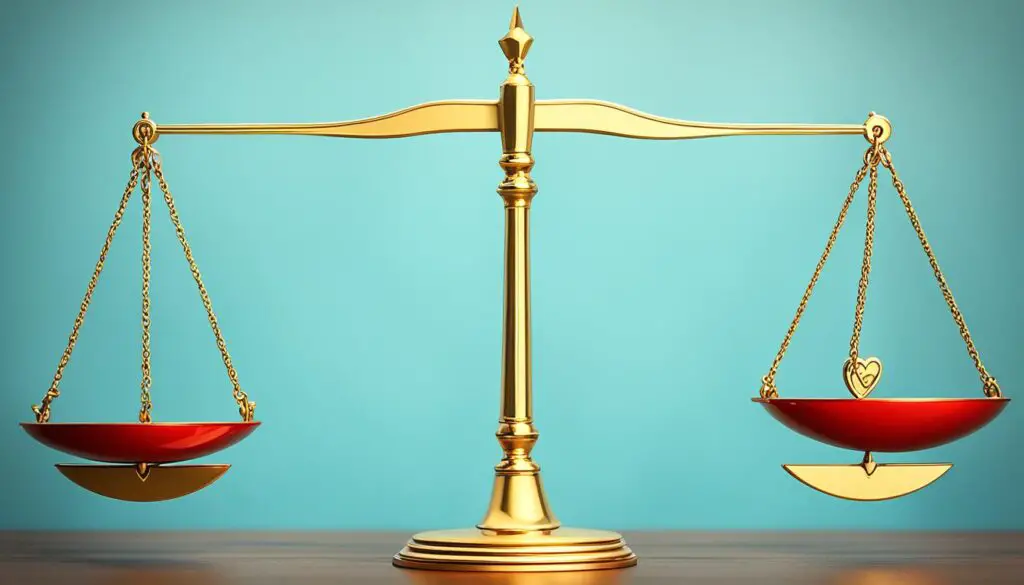Did you know that justice is a central theme in the Bible? Throughout scripture, justice is not only defined, but it is also championed as a core value for believers. Understanding the biblical perspective on justice can provide profound insights into its meaning, its relevance in our lives, and how we can contribute to a more just society.
Key Takeaways:
- The Bible offers a rich and comprehensive understanding of justice, providing guidance on fair treatment and righteousness.
- God’s justice is both retributive and redemptive, seen through His demand for righteousness and His mercy in dealing with sin.
- The Mosaic Law establishes standards of just behavior, emphasizing concern for the marginalized and vulnerable.
- Despite the prevalence of injustice in the world, believers are called to trust in God’s ultimate justice and actively promote justice in their spheres of influence.
- Aligning with biblical principles of justice can contribute to a more just society and reflect God’s character.
Understanding Justice in the Bible
The Bible addresses justice from various angles, highlighting the importance of fair treatment, honesty, and righteousness in our interactions with others. It emphasizes the need for impartial judgment and advocates for the rights of the oppressed, the poor, and the vulnerable. Through numerous verses and passages, the Bible reveals God’s desire for justice and sets a moral standard for believers.
One key aspect of justice in the Bible is the concept of divine justice. The scriptures portray God as a just and righteous judge who ensures that justice is served. His divine justice is rooted in His perfect nature, free from any bias or favoritism. Psalm 89:14 says, “Righteousness and justice are the foundation of your throne; steadfast love and faithfulness go before you.” This verse shows that justice is an integral part of God’s character and the basis for His rule.
Biblical justice extends beyond individual actions and encompasses societal justice. The Bible calls for the fair treatment of all individuals, regardless of their social status or circumstances. It emphasizes the importance of caring for the marginalized and oppressed. Proverbs 14:31 states, “Whoever oppresses a poor man insults his Maker, but he who is generous to the needy honors him.” This verse highlights the biblical perspective that justice involves not only refraining from injustice but actively advocating for the rights of those who are disadvantaged.
The Bible also provides numerous verses about justice that serve as a guide for believers to understand and practice justice. These verses inspire believers to seek justice and righteousness in their lives. Isaiah 1:17 instructs, “Learn to do good; seek justice, correct oppression; bring justice to the fatherless, plead the widow’s cause.” This verse emphasizes the responsibility of believers to actively pursue justice and defend the vulnerable.
Moreover, the Bible reveals that justice goes beyond this life and extends to eternity. It assures believers that God’s justice will ultimately prevail and that wrongs will be made right. 2 Thessalonians 1:6-7 states, “…since indeed God considers it just to repay with affliction those who afflict you, and to grant relief to you who are afflicted as well as to us, when the Lord Jesus is revealed from heaven with his mighty angels…” This passage offers hope that God’s divine justice will bring about redemption and restoration.
In conclusion, understanding justice in the Bible goes beyond a mere concept or principle; it encompasses God’s character, His call for believers to act justly, and His promise of ultimate justice. The Bible reveals that justice is deeply rooted in righteousness and encompasses both individual and societal dimensions. Believers are called to emulate God’s justice by treating others fairly, advocating for the oppressed, and seeking justice in their spheres of influence.
The Nature of God’s Justice
According to the Bible, justice is an essential attribute of God. His justice is grounded in His righteousness, and He acts as the ultimate judge who establishes and maintains the right. Scripture portrays God’s justice as both retributive and redemptive, showcasing His demand for righteousness and His mercy in dealing with sin. The cross is the ultimate demonstration of God’s justice and mercy intersecting, as Christ’s sacrifice satisfies the demands of justice and offers redemption to humanity.
God’s justice, as depicted in the Bible, goes beyond mere punishment for wrongdoing. It encompasses the restoration of harmony, the establishment of righteousness, and the vindication of the innocent. In His justice, God upholds fairness and equity, ensuring that every action has consequences and every person is held accountable for their deeds.
“For the Lord loves justice; He will not forsake His saints. They are preserved forever, but the children of the wicked shall be cut off.” – Psalm 37:28
The biblical definition of justice is deeply rooted in the nature of God. It reflects His holiness, righteousness, and love for His creation. God’s justice is impartial, fair, and unwavering, applied to all without favoritism or discrimination.
Retributive and Redemptive Justice
When we examine justice according to the Bible, we encounter both retributive and redemptive aspects. Retributive justice involves the punishment of wrongdoers, ensuring that they face the consequences of their actions. It is a reflection of God’s righteous judgment, maintaining the order and integrity of His creation.
On the other hand, redemptive justice is focused on restoration and reconciliation. It demonstrates God’s mercy and compassion, offering a path of redemption and forgiveness for those who repent. Through Christ’s sacrifice on the cross, God’s justice and mercy converge, enabling sinners to find grace and salvation.
The Bible beautifully captures this intersection of justice and mercy in Romans 3:23-24, which states, “For all have sinned and fall short of the glory of God and are justified by His grace as a gift, through the redemption that is in Christ Jesus.”
The Image of God’s Justice
When we think of justice, the cross stands as the ultimate representation of God’s justice. It reveals His righteousness, laying bare the magnitude of sin and the price that had to be paid. At the cross, God’s justice and mercy intertwine, offering salvation to all who believe.
Through Jesus Christ, God fulfills His righteous demands, upholds His justice, and offers the opportunity for sinners to be redeemed and reconciled. This demonstration of justice and mercy provides hope and assurance to believers, knowing that their sins are forgiven and that God’s justice has been satisfied.

The Righteousness of God’s Justice
God’s justice is never arbitrary or unjust. It is rooted in His perfect righteousness, ensuring that all His judgments are fair and without fault. The Bible affirms God’s righteousness in His judgments, proclaiming that He is the standard of justice for all humanity.
Psalm 89:14 declares, “Righteousness and justice are the foundation of your throne; steadfast love and faithfulness go before you.” In every act of justice, God’s righteousness is on display, illuminating the source and pattern for human justice.
Understanding God’s justice according to the Bible not only deepens our appreciation for His character but also guides us in our pursuit of justice in our society. As believers, we are called to reflect God’s justice, advocating for righteousness, standing against injustice, and defending the rights of the oppressed. By aligning our understanding and actions with the biblical definition of justice, we can contribute to a more just and equitable world.
The Call for Human Justice
The Bible not only reveals God’s justice but also calls believers to act justly in their interactions with others. Through scripture, believers are guided on how to pursue justice in their daily lives, treating others with fairness, honesty, and compassion.
The Mosaic Law, found in the Old Testament, sets clear guidelines for just behavior. It emphasizes the importance of fair treatment and protection for the oppressed, the fatherless, and the widow. Deuteronomy 10:18 says, “He defends the cause of the fatherless and the widow, and loves the foreigner residing among you, giving them food and clothing.”
“Learn to do right; seek justice. Defend the oppressed. Take up the cause of the fatherless; plead the case of the widow.” – Isaiah 1:17
Scripture urges believers to defend the weak and vulnerable, upholding the cause of the poor and marginalized. It calls for action in promoting justice within society and holding authorities accountable for ensuring justice is served. Micah 6:8 instructs, “And what does the Lord require of you? To act justly and to love mercy and to walk humbly with your God.”
Believers are warned against corruption and unfairness in Proverbs 17:15, which states, “Acquitting the guilty and condemning the innocent — the Lord detests them both.” This serves as a reminder of the grave responsibility to uphold justice.
The Example of Jesus
Jesus exemplified justice during His time on earth, advocating for the rights of the marginalized and confronting the religious leaders’ hypocrisy. He challenged societal norms and extended compassion to those in need while demanding righteousness.
“Blessed are those who hunger and thirst for righteousness, for they will be filled.” – Matthew 5:6
Believers are called to follow Jesus’ example, seeking justice for all and living out the principles of justice and righteousness in their own lives.
Justice and Love
Justice and love are intrinsically connected in scripture. 1 Corinthians 13:6 proclaims, “Love does not delight in evil but rejoices with the truth.” Genuine love seeks to promote justice and righteousness, standing against all forms of oppression and inequality.
As believers, we are called to act justly and love mercy, reflecting God’s heart for justice in our attitudes, actions, and relationships. This includes advocating for systemic change, speaking up against injustice, and uplifting those who have been marginalized.

Living in an Unjust World
While the Bible upholds the value of justice, it also acknowledges the existence of injustice in the world. In man’s injustice, due to the fallen nature of humanity, injustice in the world pervades society. The wicked often go unpunished, perpetuating a sense of injustice. The Bible laments the perversion of justice, the mistreatment of the vulnerable, and the corruption of those in positions of power.
However, despite the prevalence of man’s injustice, the Bible offers hope and guidance. It calls believers to remain faithful and to trust in God’s ultimate justice, even in the face of injustice. Scripture reminds us that God sees all acts of injustice and vows to bring about justice in His perfect timing.
“Vengeance is mine, and recompense, for the time when their foot shall slip; for the day of their calamity is at hand, and their doom comes swiftly.” – Deuteronomy 32:35
In the midst of an unjust world, believers are called to reflect God’s character by seeking justice, promoting righteousness, and advocating for the oppressed. While the task may seem daunting, the Bible provides a moral compass and a source of inspiration to address injustice with love, compassion, and perseverance. It guides us to defend the rights of others, to speak up for the voiceless, and to work towards building a more equitable society.
As we navigate through a world rife with man’s injustice and injustice in the world, we can find solace in God’s promises of ultimate justice and redemption. By aligning our actions with biblical principles, we can bring about positive change and be beacons of light in a world too often overshadowed by darkness.

Conclusion
The Bible provides a comprehensive understanding of biblical justice, encompassing both God’s character and the call for believers to act justly. It emphasizes the importance of fairness, righteousness, and advocacy for the vulnerable. Through numerous verses and passages, the Bible reveals God’s desire for justice and sets a moral standard for believers.
While injustice may be prevalent in the world, the Bible encourages believers to trust in God’s ultimate justice and take action to promote justice in their spheres of influence. By aligning with biblical principles of justice, believers can contribute to a more just society. This requires standing up for the rights of the oppressed, defending the weak, and upholding the cause of the poor.
Living in an unjust world can be disheartening, but the Bible reminds believers to remain faithful and to trust in God’s plan for justice. It acknowledges the existence of injustice and laments the mistreatment of the vulnerable. However, it also offers hope and reassurance that God’s justice will ultimately prevail.
FAQ
What is the biblical definition of justice?
The biblical definition of justice refers to fair treatment, righteousness, and the establishment of what is right. It encompasses God’s character and includes impartial judgment, advocacy for the oppressed, and the defense of the weak.
What does the Bible say about justice?
The Bible emphasizes the importance of justice in numerous verses and passages. It reveals God’s desire for justice and calls believers to act justly in their interactions with others. Scripture sets moral standards and guidelines for just behavior, urging believers to promote justice and defend the rights of the vulnerable.
How does the Bible portray God’s justice?
According to the Bible, God’s justice is grounded in His righteousness. It is both retributive, demanding righteousness and punishing sin, and redemptive, offering mercy and redemption through Christ’s sacrifice. The cross is the ultimate demonstration of God’s justice and mercy intersecting.
What is the biblical perspective on justice?
The biblical perspective on justice emphasizes the need for fairness, righteousness, and advocacy for the vulnerable. Believers are called to act justly, uphold the cause of the poor, and promote justice in society. The Bible also holds authorities accountable for ensuring justice and warns against corruption and unfairness.
How does the Bible address injustice in the world?
The Bible acknowledges the presence of injustice in the fallen world. It laments the mistreatment of the vulnerable, the perversion of justice, and the corruption of those in power. However, it encourages believers to trust in God’s ultimate justice and to take action to promote justice in their spheres of influence.
What is the role of believers in promoting justice?
As believers, we are called to act justly, show compassion, and defend the rights of the oppressed. By aligning with biblical principles of justice, we can contribute to a more just society. While injustice may be prevalent, our faith in God’s ultimate justice empowers us to remain faithful and take action for justice.








Leave a Reply